If you’re wondering how long a cover letter should be, this article has everything you need to know (including exactly how many words to make your cover letter).
I’m going to share why most job seekers are making their cover letters far too long, and why you will likely get more job interviews by writing less in your cover letter.
Let’s get started…

How Long Should a Cover Letter Be?
Cover letters should be one page long and total 75 to 250 words. This recommendation applies to both printed and email cover letters. It’s okay if your cover letter doesn’t take up an entire page, but it should never exceed one full page.
Job seekers needing to explain gaps in employment , a recent change in career path, etc., may want to utilize more words in their cover letter than someone with a more standard background.
A job seeker who is staying within their current industry and career path (e.g. moving from Software Engineer to Senior Software Engineer) and not needing to explain a lengthy work gap should aim to be on the lower end of the recommended cover letter word count mentioned above — somewhere between 70 and 150 words.
As an example, my favorite cover letter template from Harvard Business Review has only 76 words:

As you customize this cover letter, the word count will likely rise a bit, but it’ll remain much shorter than what most job seekers send. And that’s a good thing!
This type of letter is going to be very different than what most job seekers are sending and what you’ve seen recommended online, and that’s often a plus.
Coming up soon, I’ll explain why a shorter cover letter may improve your odds of hearing back on a job application.
How Many Paragraphs Should a Cover Letter Include?
The typical cover letter should contain three to six paragraphs. Each paragraph should be relatively short, containing two to four sentences. This is especially important in the first paragraph of your cover letter, where you want to entice the reader and encourage them to keep reading by providing a short, punchy opening.
In general, when writing to grab someone’s attention, focus heavily on making the first paragraph compelling, because this is your first impression or “elevator pitch,” for why they should keep reading.
Now that you know how long a cover letter should be, let’s look at some specific benefits of using this length, which is shorter than some people recommend.
Reasons to Consider a Shorter Cover Letter
Now that you know how many words a cover letter should be, let’s talk about why I recommend this as the ideal length, even though some career experts recommend your cover letter be longer.
There are four things that happen when you keep your cover letter relatively short…
1. You Stand Out by Being Different
Here’s an example of a typical full-page cover letter that many job seekers are sending:

If you’ve sent something like that in the past, it’s NOT your fault…
Almost every website with cover letter templates recommends this format, and it’s what you’re constantly told to send.
But that’s the beauty of limiting your cover letter to my ideal cover letter length of 75 to 250 words. It’s different than what everyone else is doing!
From the first glance, you’re showing the hiring manager that your cover letter is unique and worth reading closely . You show that you’re not going to bore them half to sleep with yet another generic letter containing info from a template or info that’s already on your resume.
Whereas, if you send a full-page cover letter like the image/example above, the hiring manager is thinking, “Okay, here’s another huge page of info to read through that’s probably based on a template.”
This happens to them over and over, all day.
That brings me to my next benefit…
2. You Get Your Cover Letter Read (Not Skimmed!)
Most job seekers send cover letters that so long-winded that nobody wants to read them. The hiring manager may read to the second or third paragraph, but they’re unlikely to through to the end.
Beyond that, job hunters send cover letters that repeat information from their resume, which doesn’t provide any value to the hiring manager or recruiter .
But because your cover letter is short, and ideally has small paragraphs, it’s inviting to read. Hiring managers open your email or letter and think, “Great, I can read this no problem.”
So they read your cover letter from start to finish without skipping a word!
This is why you should always send the hiring manager a short cover letter where each line has a purpose and message and does something to sell them on why you deserve the interview.
You don’t have to take my word for it, though. Test it! Send half of your cover letters in the standard, full-page style seen above, but with the other half, test what I’m suggesting here. Greatly reduce the word count, get right to the point, only offer info that’s not on your resume.
We’ve now looked at two reasons why the full-page cover letter is not the ideal length/approach. But I’ve got two more reasons for you…
3. You Draw Attention to Your Strongest Points/Skills
If you’re naming 20 different skills and qualifications in your cover letter, it’s hard for a recruiter or hiring manager to pick out the most important pieces.
Whereas, if you just name your three or four strongest arguments for why you’d be a great fit for their job description, those points will stand out (and get read, as mentioned above).
Sometimes less is more, and with cover letters, it’s often the case!
So this is another factor to consider when deciding how long your cover letter should be.
4. You Get Your “Call to Action” Read So You Win More Interviews
Finally, you should end each cover letter with a “Call to Action,” which I’ll explain in the next section.
This is where you ask for the interview, which is something many job seekers don’t do properly (or don’t do at all) in their cover letter.
And by keeping your letter brief, this closing paragraph comes relatively quickly… sometimes as the third or fourth paragraph… so it’s much more likely to get the reader’s full attention which means you’ll get more interviews.
Recommended Cover Letter Font Size
The best font size for your cover letter is 12 points, whether you’re sending a printed or an email cover letter. Avoid fancy fonts and choose a simple, easy-to-read font like Calibri or Arial. Include plenty of white space and small, punchy paragraphs. It’s better to have multiple, concise paragraphs in your cover letter than one or two very long paragraphs. This helps with readability.
How to End Your Cover Letter: Ask for the Interview
This is one other mistake a lot of job seekers make with their cover letters, along with repeating info on the resume and just being far too long-winded. They don’t ask for the interview in their closing paragraph!
The whole point of the cover letter is to win you job interviews . So after you’ve got the specific word count you want, make sure to finish up by actually asking the hiring manager to call you and set up a time to discuss in more detail!
Here’s an example of how you could conclude an email cover letter:
I’d love to discuss the position over the phone and provide a bit more context for how I can help you in this role. Are you available for a phone call later this week or early next week? My phone number is 555-218-4987.
Or, simply use the cover letter conclusion from the first example in this article, from Harvard Business Review:
I have attached my resume for your review and would welcome the chance to speak with you sometime.
However, I prefer a slightly stronger conclusion to a cover letter that really prompts the hiring manager to reply to a direct question. That should get you more responses from your cover letter, no matter your cover letter length!
Conclusion: How Many Words Should a Cover Letter Be?
To reiterate how long a cover letter should be, I recommend sticking to 250 words or less and never exceeding one page.
It’s beneficial to keep your letter short and concise for both a printed cover letter and a cover letter sent by email.
The shorter format allows you to focus on your strongest points and grab the hiring manager’s attention without overwhelming them with too much text or info. This will help you get more interviews and separate you from other job seekers who send long, generic, cut-and-paste cover letters with their applications.
However, as mentioned earlier, the length of your cover letter will vary depending on the industry (in a very formal, traditional industry, you may want to go for a slightly longer word count).
If you have an unusual scenario to explain, then your ideal cover letter length may be longer, too.
So don’t take the advice above as a hard-and-fast rule, but just a general guideline on how long a typical cover letter should be to win more job interviews.
As a final step, make sure to proofread everything! Sending a cover letter with a typo or mistake can cost you the job interview even if you have great qualifications and writing style.
More cover letter resources:
- Do you need to send a cover letter?
- How to write a cover letter with no experience
- 3 steps to writing a cover letter that stands out

About the Author
Read more articles by Biron Clark
Continue Reading
How to Write a Graphic Designer Cover Letter (3 Examples)
How to write a paralegal cover letter (2 examples), how to write a medical assistant cover letter (3 examples), how to write a research assistant cover letter (3 examples), how to write a software engineer cover letter (3 examples), how to write a hr cover letter (4 examples), how to write a data analyst cover letter (3 examples), how to write a bartender cover letter (3 examples).
Privacy preference center
We care about your privacy
When you visit our website, we will use cookies to make sure you enjoy your stay. We respect your privacy and we’ll never share your resumes and cover letters with recruiters or job sites. On the other hand, we’re using several third party tools to help us run our website with all its functionality.
But what exactly are cookies? Cookies are small bits of information which get stored on your computer. This information usually isn’t enough to directly identify you, but it allows us to deliver a page tailored to your particular needs and preferences.
Because we really care about your right to privacy, we give you a lot of control over which cookies we use in your sessions. Click on the different category headings on the left to find out more, and change our default settings.
However, remember that blocking some types of cookies may impact your experience of our website. Finally, note that we’ll need to use a cookie to remember your cookie preferences.
Without these cookies our website wouldn’t function and they cannot be switched off. We need them to provide services that you’ve asked for.
Want an example? We use these cookies when you sign in to Kickresume. We also use them to remember things you’ve already done, like text you’ve entered into a registration form so it’ll be there when you go back to the page in the same session.
Thanks to these cookies, we can count visits and traffic sources to our pages. This allows us to measure and improve the performance of our website and provide you with content you’ll find interesting.
Performance cookies let us see which pages are the most and least popular, and how you and other visitors move around the site.
All information these cookies collect is aggregated (it’s a statistic) and therefore completely anonymous. If you don’t let us use these cookies, you’ll leave us in the dark a bit, as we won’t be able to give you the content you may like.
We use these cookies to uniquely identify your browser and internet device. Thanks to them, we and our partners can build a profile of your interests, and target you with discounts to our service and specialized content.
On the other hand, these cookies allow some companies target you with advertising on other sites. This is to provide you with advertising that you might find interesting, rather than with a series of irrelevant ads you don’t care about.
How Long Should a Cover Letter Be in 2023? (+Examples)

Do you want to know what the perfect length of a cover letter is? What is the ideal number of words that a cover letter should have? And how many paragraphs should you include? If you are looking for answers to these and more cover letter questions, you are in the right place.
The quick answer is that a cover letter should never be longer than a page, 400 words, or six paragraphs.
However, if you want to dive deeper into the cover letter nuances and become a real expert, you are in the right place. So, if you want to learn in detail how to write the perfect cover letter of a perfect length, just keep reading.
For more general information about cover letters , go and have a look at the first article from our series Cover Letter Guide: What is the Cover Letter. There, you will find a definition of what a cover letter is, what makes it different from a letter of motivation, and a short guide on how to write a great cover letter.
Find out your resume score!

What is the ideal cover letter length for 2023?
When it comes to cover letters, the longer, the better does not apply. Even if you have years of expertise and you worked extremely hard on gathering professional skills and experiences — and now you want to show it off all in detail on four pages — don’t.
Sometimes, less is more. This is the case for a good cover letter. It is crucial to highlight the experiences that are truly relevant to the advertised position. Don’t worry, there will be plenty of time to talk about your skills and achievements in more detail once you get the interview.
Rather, think of a cover letter as a tasteful, comprehensive, short advertisement. You want to catch the attention of a hiring manager and make it clear that you are a highly experienced professional fit for the role. Yet, at the same time, you don’t want to bore and overwhelm the person who is making the selection in the first round of the hiring process.
It is important to realize that in large companies, the hiring manager and the HR department have a very short time to go through your application. On average, per one vacancy, there are up to 250 applicants. This means you must make your cover letter stand out from the crowd – but also be easy to read.
What follows are the tips on how to do it!
Read the instructions
Always make sure you read the employers’ instructions properly. In many vacancy announcements, there is a clear list of what is required from an applicant. Often, these also indicate the expected length and form of a cover letter.
If specific regulations are not included, don’t worry. In this case, you can go for the standardized version of a cover letter.
Junior vs Senior
If you are at the start of your career and are applying for a junior position where it is expected to have a lack of practical experience, writing around 200 words is perfectly acceptable. A cover letter for an internship can be equally long. If you don’t have prior experience, you can focus on your inner motivation, education, and extra-curricular activities.
For an experienced candidate , the word count can be doubled. However, it really shouldn’t exceed 400 words in any scenario – unless specifically requested. At the same time, a cover letter should never exceed 1 page. If you do so, you completely disobey all the rules of this genre, and it won't work to your advantage.
While this length may sound too short, and you may feel tempted to write more about many of your professional accomplishments, it may eliminate you from the selection process. Being selective and cutting straight to the point makes you a better candidate as opposed to one who writes their whole life story.

Career vs Academic cover letter
The rules listed in the previous paragraph are almost universally true when we speak of a career cover letter.
However, an academic cover letter is conventionally longer. If you are wondering how long an academic cover letter should be, know that the standard length is one page and a half . On the other hand, it is never longer than two pages.
Cover letter heading length
The same cover letter rules apply here, too. A short, simple, and catchy heading will get you far.
Do not exceed two sentences; one is advisable. Either use your full name or a catchphrase, such as: “ Why am I the best for the role of XY ”. However, do this only when you are sure that the company and the position that you are interested in aren't too formal.
How long should the first paragraph be
This paragraph is to capture the attention of the reader. It does not have to be longer than two or three sentences. State who you are, where and how you found the opportunity, and why you are interested in it. Do this in a catchy way, though! If you heard about the position from a person in common, do not hesitate to mention their name.
Remember, the first paragraph is short – do not waste words. Make yourself an attractive candidate right from the beginning, and mention your biggest assets right here – such as the length of experience or quality of your education.
How long should the second paragraph be
Arguably the most important part of your cover letter. Therefore, you should make the second paragraph the most extensive and longest part of your cover letter. Write about your accomplishments and past work experiences in detail. Explain why you are the best candidate for the role and what your skills are that no one else has.
On the other hand, remember — you still must write at least one more paragraph in the body of the cover letter, as well as the closing paragraph. Therefore, don’t go overboard with the length.
The best thing to do is to initially write freely and more. Then, you can cut the number of words down later during later stages of editing. This way, you won’t limit your creativity from the start by being too focused on the correct word count.
How many words/paragraphs should a cover letter be
- As we've already stressed, your cover letter shouldn’t be too long. Keep it under one page. However, sometimes only half a page may not be long enough. Find the right balance.
- When it comes to the number of words, never exceed 400 words. 250-300 words are the ideal length of an average cover letter.
- The perfect number of paragraphs in a cover letter ranges from three to four. The maximum number of paragraphs that are acceptable is six.
Cover letter examples by length
If you want to see the instructions applied in real life, have a look at the cover letter examples of various lengths examples below. All three of these people managed to land the job by using the kickresume cover letter template !
Cover letter example 1: Short version: Half a page
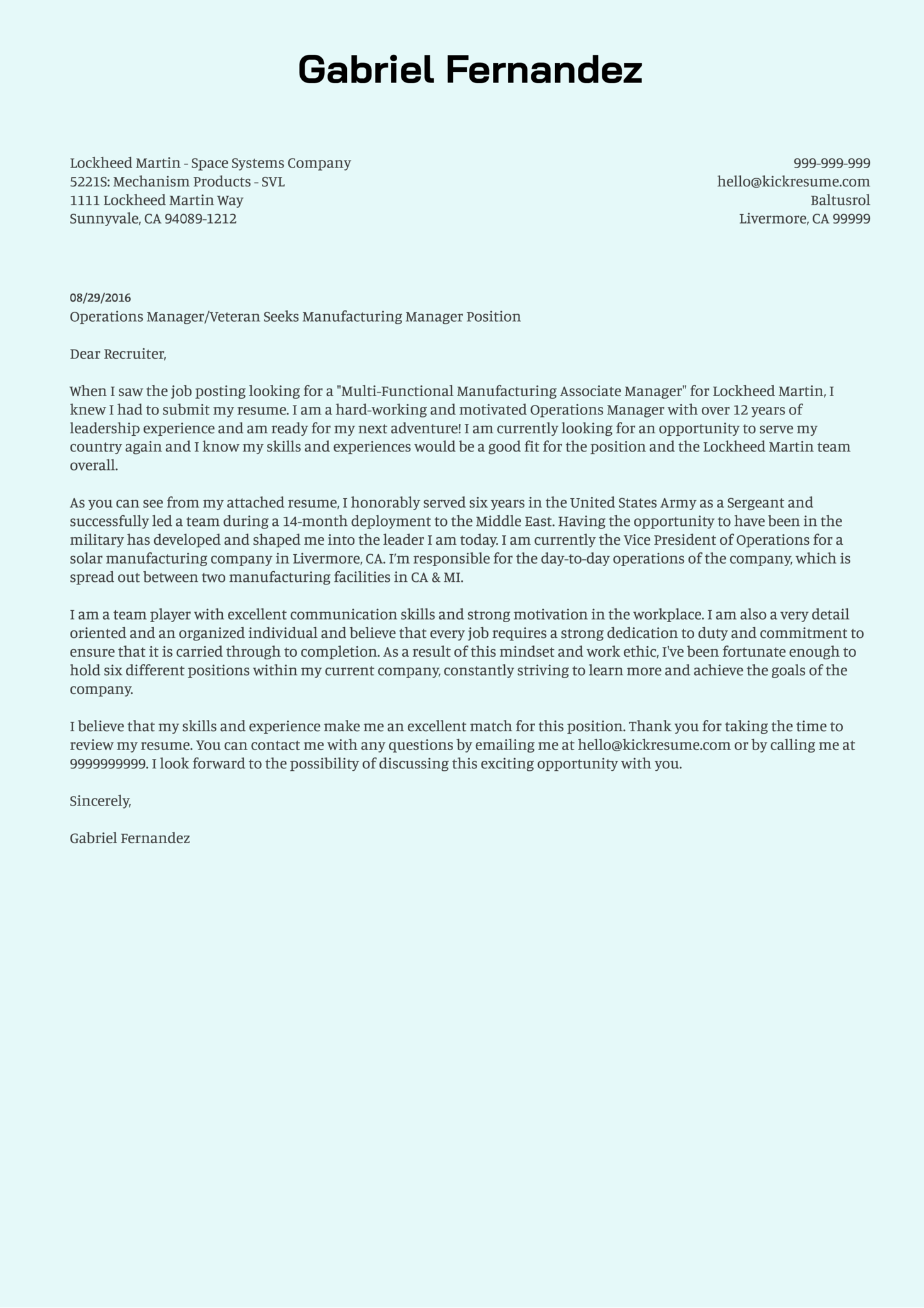
Cover letter example 2: Medium version: Between half a page and a page
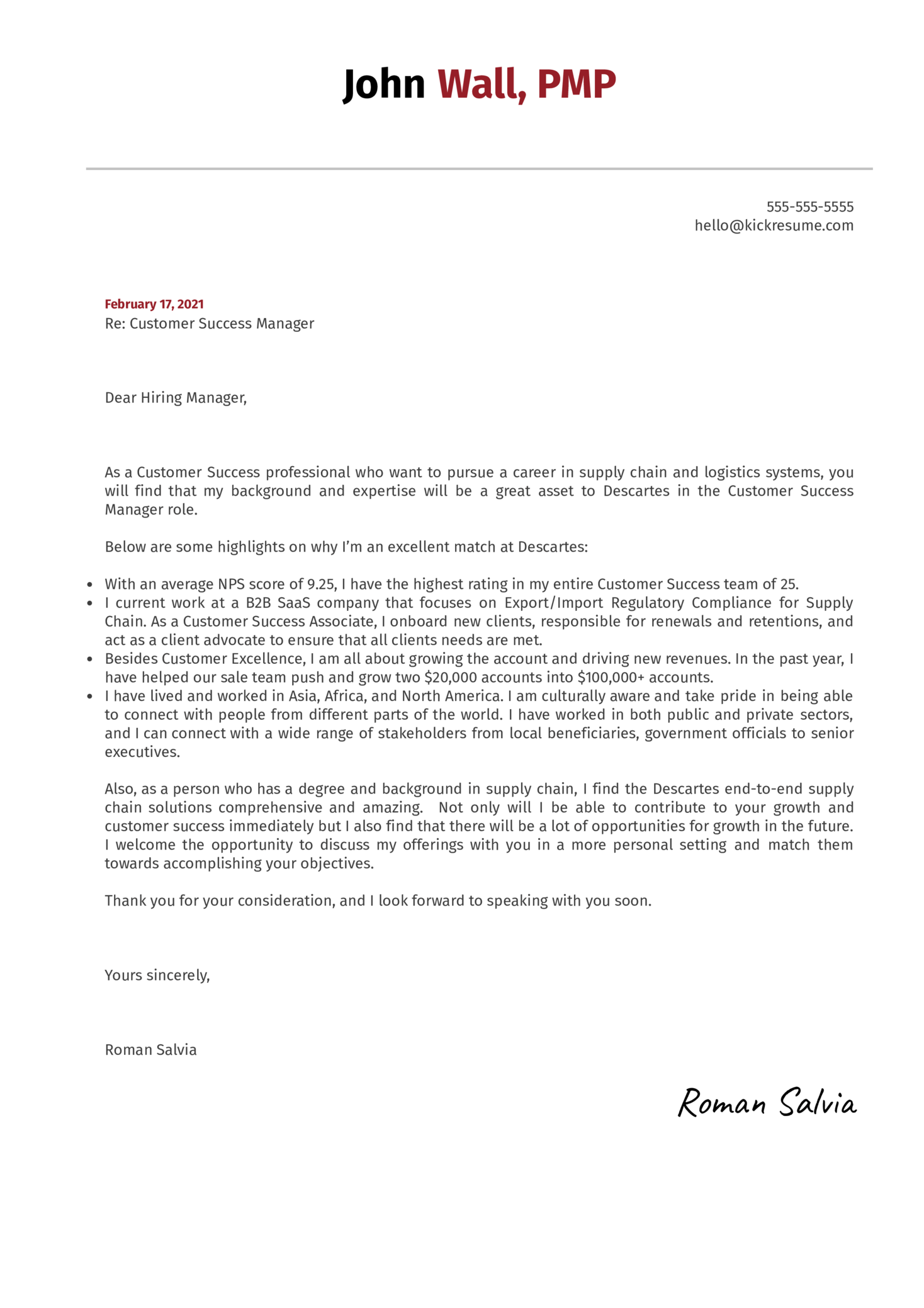
Cover letter example 3: Long version: A page
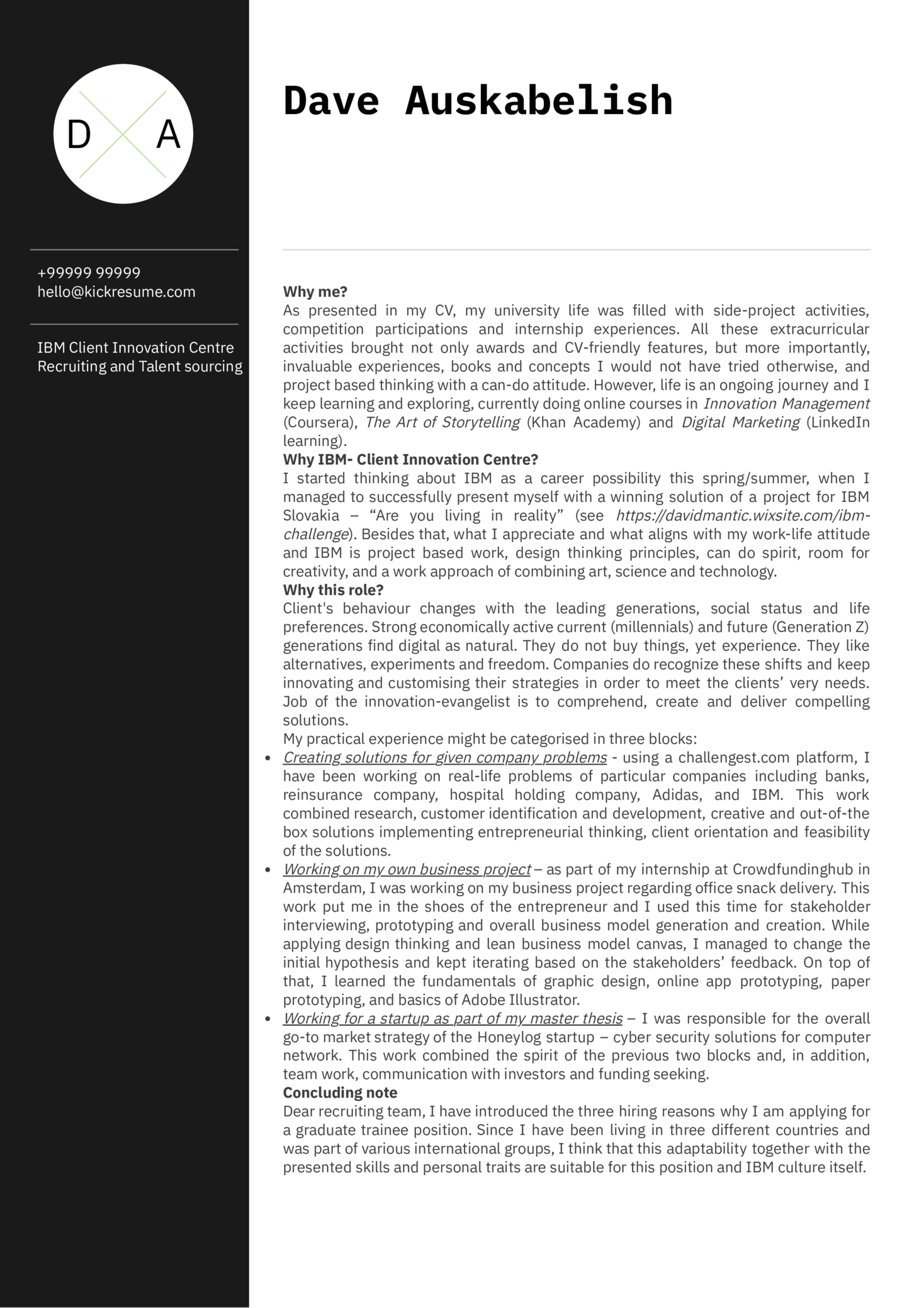
If you liked these cover letter samples and you want your cover letter to look the same, use one of our cover letter templates! You can go for the free or the premium version. It is super easy to use, so you’re just a click away from the cover letter of your dreams!
Cover letter formatting
Not only length but also the way you format the cover letter matters. Your goal is to make it very easy to read. You will achieve this by keeping your cover letter structured, nicely designed, and well-formatted. Here are the tips on how to achieve this:
- When it comes to the font of a cover letter, try to imagine being a busy hiring manager. You want to make their job as easy as possible – so go for a font that is easy to read. At the same time, you want to create a professional impression. In other words, the best font for your cover letter would be the classic Times New Roman, Arial , or Calibri . However, if you are confident enough to experiment and you want to make your cover letter stand out from the crowd with a more eye-catching design, go for it. But forget to ensure that the text should be easy to navigate and read – that is the priority.
- The letter size matters, too. Anything between 10.5 and 12 is good. You don’t want to make the letters too small, so they would be hard to read, or too large, so you don’t exceed one page.
- The margins of a cover letter are conventionally 1.5 or 1.
- A cover letter should never be double-spaced. You want to fit all the information on one page — with double spacing, you wouldn’t be able to.
How long should an email cover letter be?
Today, unless specifically instructed to do otherwise, the cover letter is conventionally sent as an email attachment.
Just like with the cover letter itself, sending a short and precise email is better than a long and overly complicated one.
In your email you must include:
- a relevant subject: if the subject title is not included in the vacancy instructions, use the name of the position for which you are applying;
- a polite greeting: address the person by their full name/if not available, Dear Sir/Madam will do
- refer to your attached cover letter and resume;
- express hopes for the future , consider attaching a phone number where they can reach you;
- close with best regards/best wishes and your full name and surname;
Email cover letter length examples
Email cover letter example 1.
Email cover letter example 2
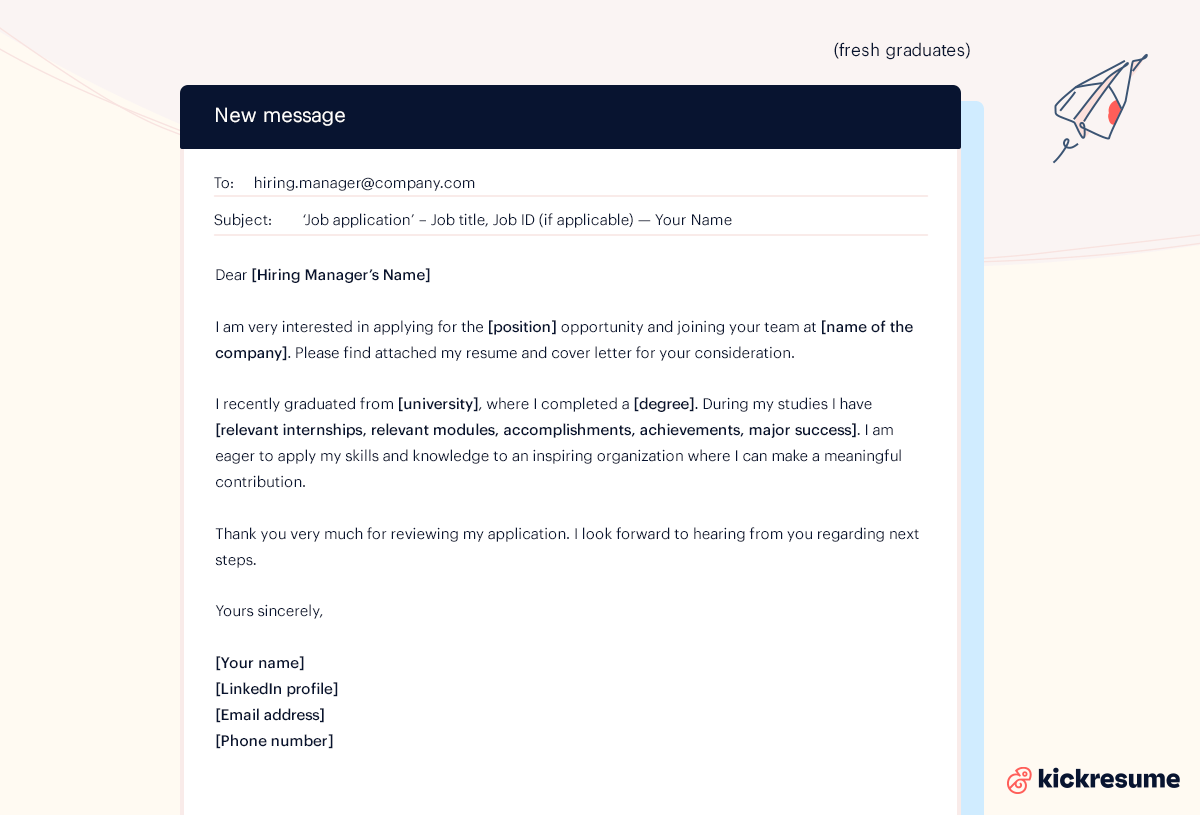
Email cover letter example 3
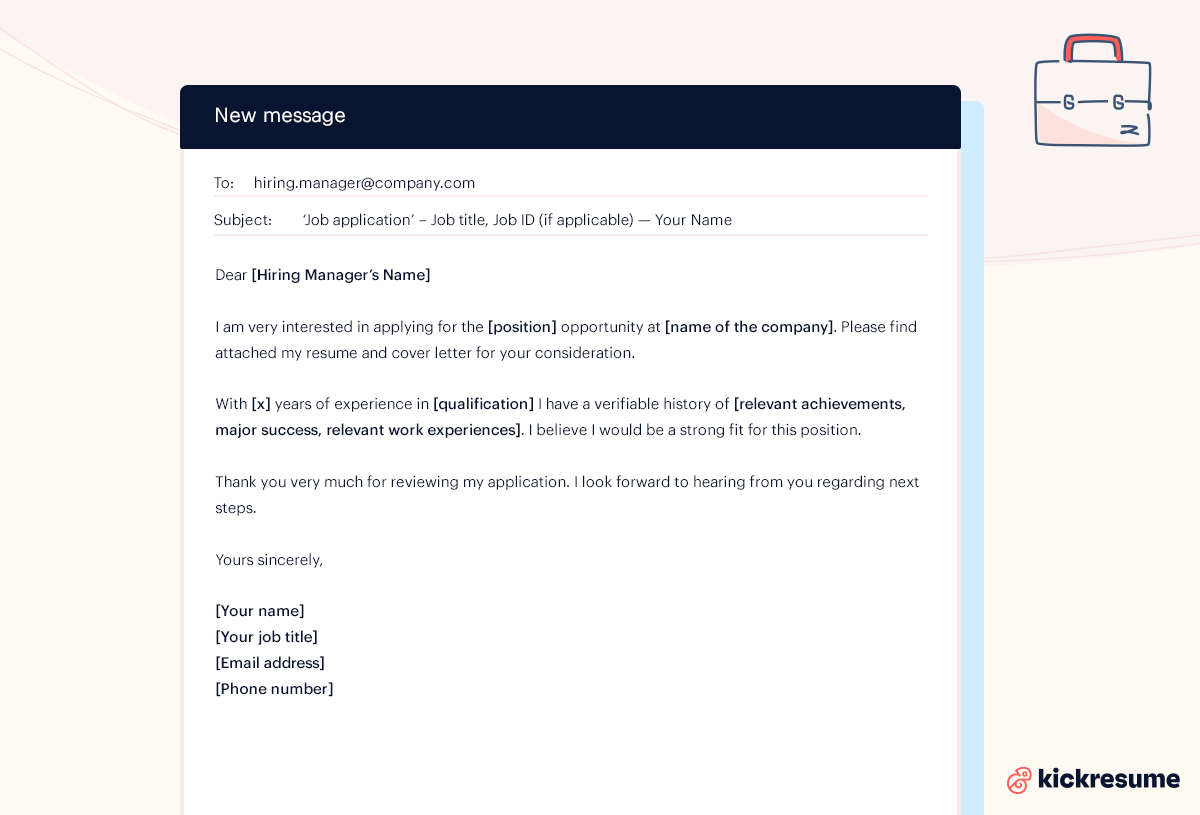
And that’s about it. There is no need to make it too elaborate – all the important information is in the attachment.
Now hit that send sign and wait for the response. After listening to all the advice, we have no doubts you will receive positive news. The Kickresume team wishes you the best of luck!
Now, when you have that cover letter in your pocket, we are sure you also want an amazing-looking resume. The good news is that you are just a click away from our Kickresume CV templates! You can even easily turn your LinkedIn profile into a great resume .
FAQ: How long should a cover letter be in 2023
What is the ideal word length of a cover letter.
Your cover letter should be between 250 to 400 words long.
A cover letter isn't required – should I still send it?
Yes, this is your chance to stand out from the crowd of applicants and make it clear that you’re willing to put in the effort.
Is a 1000-word cover letter too long?
Yes, it is. It's never advised to exceed 400, max. 500 words.
Is it ok to have a cover letter that is two pages long?
No, you should always limit your cover letter to only one page. Recruiters don't have time to read long essays. They also like familiarity and known formats.

Kaja Jurčišinová
Kaja Jurcisinova is a fresh graduate and a junior copywriter at Kickresume. Kaja completed her undergraduate degree in Art History at the University of St Andrews in 2018 and graduated with a Master’s in Arts and Culture from the University of Groningen in 2021. She was an intern at multiple cultural institutions across Europe, including the Dutch Museum Association in Amsterdam, the Matter of Art Biennale in Prague, and the European Cultural Centre in Venice. At the moment, she resides in Visby on the Swedish island of Gotland.
Hungry for more?
How to write a professional resume summary [+examples], how to put your education on a resume [+examples], how to describe your work experience on a resume [+examples], let your resume do the work..
Join 5,000,000 job seekers worldwide and get hired faster with your best resume yet.

How Many Paragraphs Should a Cover Letter Have [4 Examples]
Understanding the ideal structure and length of a cover letter is crucial for job seekers aiming to make a strong impression on potential employers. A well-structured cover letter complements a resume and allows candidates to introduce themselves, showcase their skills, and demonstrate their enthusiasm for the position and company. In this article, we will answer the question "how many paragraphs should a cover letter have" by providing guidance on the ideal structure and length of a cover letter. Expect expert advice, practical tips, and examples to help you craft an effective cover letter that stands out from the competition.
The Purpose of a Cover Letter
A cover letter serves as a personalized introduction to the employer, highlighting relevant skills, experiences, and enthusiasm for the job and company. It plays a vital role in the job application process, helping candidates stand out from the competition . It is important to tailor the cover letter to the specific job and company, showcasing why you are the ideal candidate for the position. Generic, uninspired cover letters can be detrimental to your application, as they may not capture the reader's interest or demonstrate your suitability for the role.
Ideal Structure and Length
An effective cover letter should have 3 to 6 paragraphs, including an introduction, relevant experience, company details or more qualifications, and a closing. The ideal length for a cover letter is 250-400 words , with concise, focused writing being key to making a strong impression. While there is a suggested structure for an effective cover letter, it is essential to tailor the letter to the job and company. Deviations from the suggested structure may be necessary to best showcase your skills and experiences.
Example of a Well-Structured Cover Letter: Introduction: A compelling opening sentence mentioning the position being applied for and a brief overview of the candidate's suitability for the role. Relevant Experience: A paragraph showcasing the candidate's skills and accomplishments that align with the job requirements. Company Details or Additional Qualifications: A paragraph demonstrating the candidate's knowledge of the company and its values or discussing further qualifications that strengthen their suitability for the position. Closing: A paragraph reiterating the candidate's interest in the position, providing a clear call to action, and expressing gratitude for the opportunity to apply.
Crafting the Introduction
The introduction paragraph should grab the reader's attention, mention the position being applied for, and provide a brief overview of the candidate's suitability for the role. A strong opening sentence is crucial, as it sets the tone for the rest of the cover letter. Personalizing the introduction and incorporating a compelling hook can capture the reader's interest . Additionally, it is important to connect the introduction to the specific job and company, demonstrating your enthusiasm and understanding of the role.
Example of an Effective Introduction Paragraph: "As a marketing professional with five years of experience driving successful campaigns for well-known brands, I was thrilled to see the opening for a Marketing Manager at XYZ Company. Your commitment to innovation and customer-centric approach aligns with my passion for creating impactful marketing strategies that foster long-lasting relationships with consumers."
Showcasing Relevant Experience
The body of the cover letter should focus on relevant experience, demonstrating how the candidate's skills and accomplishments align with the job requirements. It is important to be selective when discussing experiences and accomplishments, as too much information can dilute the overall impact of your cover letter. Highlighting transferable skills can be especially valuable for candidates transitioning to a new industry or role. Storytelling techniques can be employed to effectively showcase your relevant experience, making it relatable and engaging for the reader. Remember to connect your experiences to the job and company, demonstrating your understanding of the position and its requirements.
Example of an Effective Paragraph Focused on Relevant Experience: "In my previous role as a Marketing Coordinator at ABC Agency, I successfully managed a variety of digital marketing campaigns for clients in the retail and hospitality sectors. Through data-driven strategies and creative content development, I increased website traffic by an average of 30% and boosted social media engagement by 25% across all client accounts. My ability to analyze market trends and adapt campaigns accordingly allowed me to deliver consistent results that exceeded client expectations. I am confident that my experience and skills in digital marketing would make me a valuable asset to XYZ Company's marketing team."
Delving into Company Details or Additional Qualifications
Additional paragraphs can be used to discuss company-specific details or further qualifications that strengthen the candidate's suitability for the position. Showing knowledge about the company and its values demonstrates your genuine interest in the role and organization. When discussing additional qualifications, such as certifications or awards, ensure that they are relevant and add value to your application. Addressing company-specific challenges or goals in your cover letter can help you stand out and show your problem-solving abilities. Maintain a strong connection between these paragraphs and the job and company to keep the focus on your suitability for the role.
Example of an Effective Paragraph Focused on Company Details or Additional Qualifications: "I recently completed a certification in data analytics, which has equipped me with the skills to analyze and interpret large datasets to drive marketing decisions. I understand that XYZ Company values data-driven strategies and continuously seeks to optimize its marketing efforts. My certification, combined with my experience in digital marketing, would enable me to contribute significantly to your team's goal of increasing customer acquisition and retention rates."
Crafting the Closing
The closing paragraph should reiterate the candidate's interest in the position, provide a clear call to action, and express gratitude for the opportunity to apply. A strong closing leaves a lasting impression and reinforces your enthusiasm for the role and company. Offer tips for expressing enthusiasm and interest in the role and company, such as mentioning specific aspects of the job or organization that excite you. A clear call to action guides the reader's next steps, such as scheduling an interview or reviewing your resume. Maintain a professional and courteous tone in the closing, showing respect for the reader's time and consideration.
Example of an Effective Closing Paragraph: "I am excited about the opportunity to contribute to XYZ Company's ongoing marketing success and believe that my skills and experiences align with the requirements of the Marketing Manager role. I would be grateful for the opportunity to discuss my qualifications further in an interview. Thank you for considering my application, and I look forward to the possibility of working with the XYZ team."
Common Mistakes to Avoid
Job seekers should be aware of common mistakes when crafting a cover letter, such as excessive length, lack of personalization, and focusing too much on personal interests. These mistakes can negatively impact the effectiveness of your cover letter and may lead to your application being overlooked. To avoid these pitfalls, keep your cover letter concise and tailored to the job and company. Use specific examples to showcase your skills and experiences, and ensure that your cover letter complements your resume rather than rehashing its content. Proofreading and editing your cover letter is crucial, as errors can leave a negative impression on potential employers. Seek feedback from trusted sources, such as mentors or career advisors, to further refine your cover letter and increase your chances of success.
Final Thoughts
By understanding the ideal structure, length, and content for an effective cover letter, job seekers can make a strong impression on potential employers and increase their chances of landing an interview. Remember to tailor your cover letter to the specific job and company, ensuring that you demonstrate your understanding of the position and its requirements. Apply the advice and tips provided in this article to craft a compelling cover letter that highlights your unique skills, experiences, and enthusiasm for the role. For further guidance and assistance in crafting an effective cover letter, consider exploring additional cover letter resources and seeking feedback from trusted sources. We wish you the best of luck in your job search and future career endeavors.
How Long Should a Cover Letter Be in 2024?

Finally, an organization posted your dream job. You crafted a flawless resume and now you’re ready to apply. You land on the cover letter section of the application and see that it is optional. Is it truly optional?
Will not submitting make me less likely to land the job? Where do I even start and how long should the cover letter be?
These are some things that might run through your head. But don’t panic, we are here to help. No matter what your career level is, your cover letter can set you apart from the other applicants. But how much do you have to write?
This can be a complicated question. Too much text? The hiring manager might glance over it. Too short? The recruiter may think that you didn’t put much thought or effort into writing the cover letter .
Cover letters should range from a half-page to one full page. Your cover letter should never exceed one page in length.
- Page Count: 0.5 to 1
- Word count: 250 to 400
- Paragraph count: 3 to 6
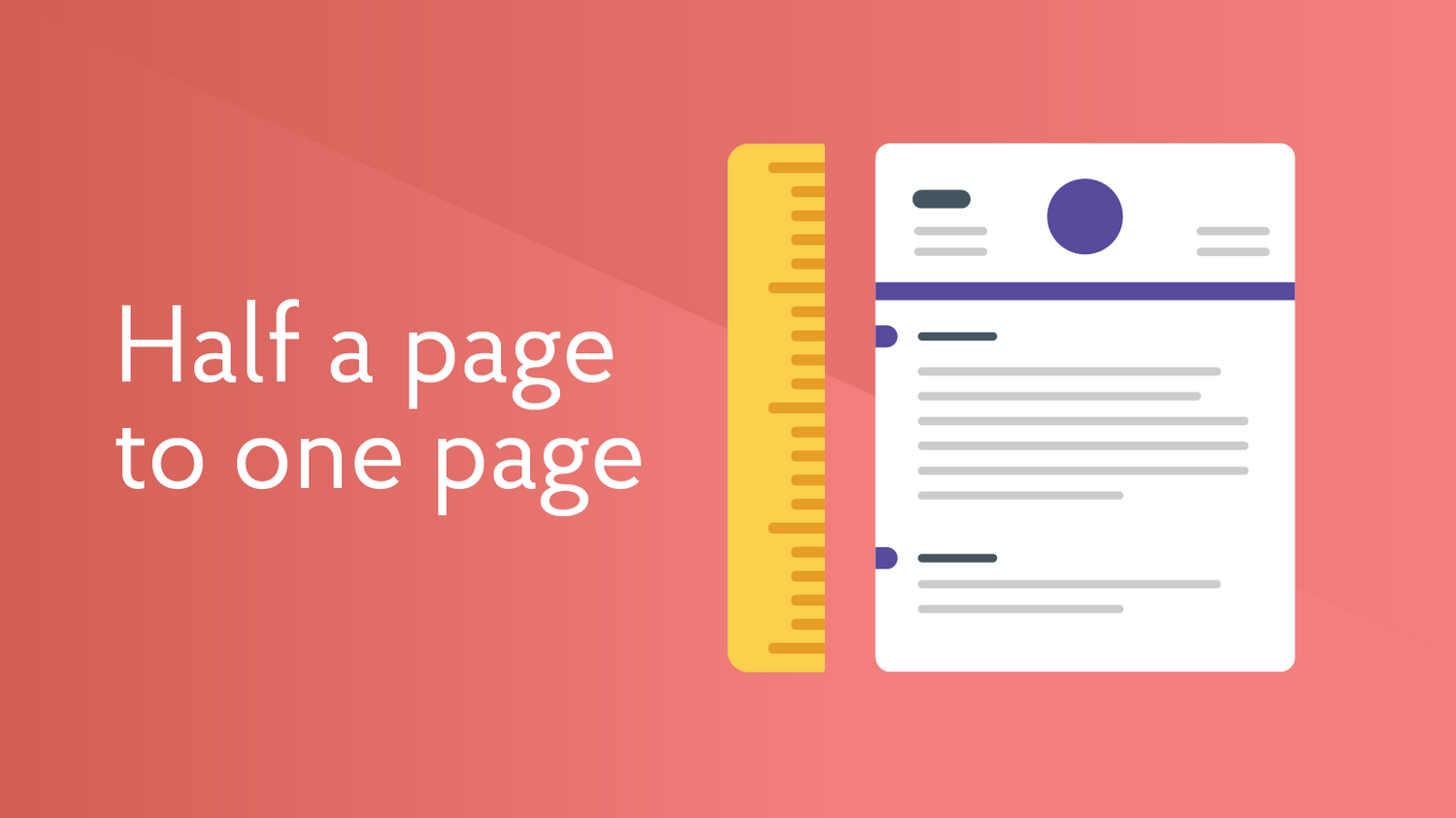
How to Keep Your Cover Letter to One Page
Tip #1: keep it concise.
While the cover letter is a great way to showcase your personality, it is also very important to be concise. Hiring managers are sifting through dozens, and maybe even hundreds, of applications.
They do not have time to read a full two-page article about your daily tasks. Instead, highlight any relevant experiences that show your qualifications for the specific job.
Demonstrate your passion for the industry and end the letter. The decision-maker will appreciate your brevity and may even reward you with an interview .
Tip #2: Highlight Only Relevant Experiences
Unless the employer requests a specific word count, keep it short. Take only the amount of space required to show that you are an ideal candidate for the job.
Highlight your qualifications and any relevant stories. It’s important to be specific, and not regurgitate the content on your resume.
It is very important here to showcase how your past achievements can help the company solve their current challenges and how you will use your skills if chosen for the position.
Doing so will show the recruiter or hiring manager the value you can bring to their organization.

Tip #3: Break Your Cover Letter into Sections
An effective cover letter contains three to four paragraphs. It’s important to keep the sentences short so the reader can quickly navigate your cover letter.
Paragraph #1: The Intro
The first paragraph should grab the decision-maker’s attention. This is an opportunity to show your interest in the position and knowledge of the company. Make sure you address your cover letter to the correct person or department. Always be sure to research the company and customize each cover letter to the position you are applying for.
Example: “I am excited to submit my application for the position of [insert position name] with [insert company name]. I have watched your growth for years and really appreciate the devotion to serving your customer’s needs.”
Paragraph #2: Your Qualifications
The second paragraph should highlight relevant stories or stats that impress your qualifications. For example, “In the previous company, I grew sales by 150% in my first year and 200% in my second year.” It is helpful if you can be specific in how you achieved success or benefited the company in some way. This highlights what you bring to the table and how you can make an impact on the hiring manager’s business.
Paragraph #3: Your Interest in the Company
The third paragraph, if you choose to include it, can speak to what drew you to apply to the specific company. This can sway the hiring manager's decision by showing passion and loyalty to the company.
Paragraph #4: The Closing
The final paragraph should reiterate your interest in the position. It is a great time to thank the reader for their consideration and request an in-person meeting. It’s important to have a call-to-action so the reader knows what to do next. Always include detailed contact information.

Tip #4: Experience Level
Cover letters can vary based on your experience level. If you are applying for jobs right out of college, don’t include metrics measured in school, such as GPA, unless requested. Instead, focus on your experiences, projects and achievements that make you a strong candidate.
If you are in the middle of your career, pick out relevant accomplishments and state your experience level. For example, “With 12 years of teaching experience, I am writing to express my interest in the open position in your Mathematics Department.”
If you have more experience, you likely have more relevant qualifications and stories. This may entice you to make your cover letter longer. Do not fall into the trap.
Longer does not mean better . Select a few key successes and leave others for the interview process.
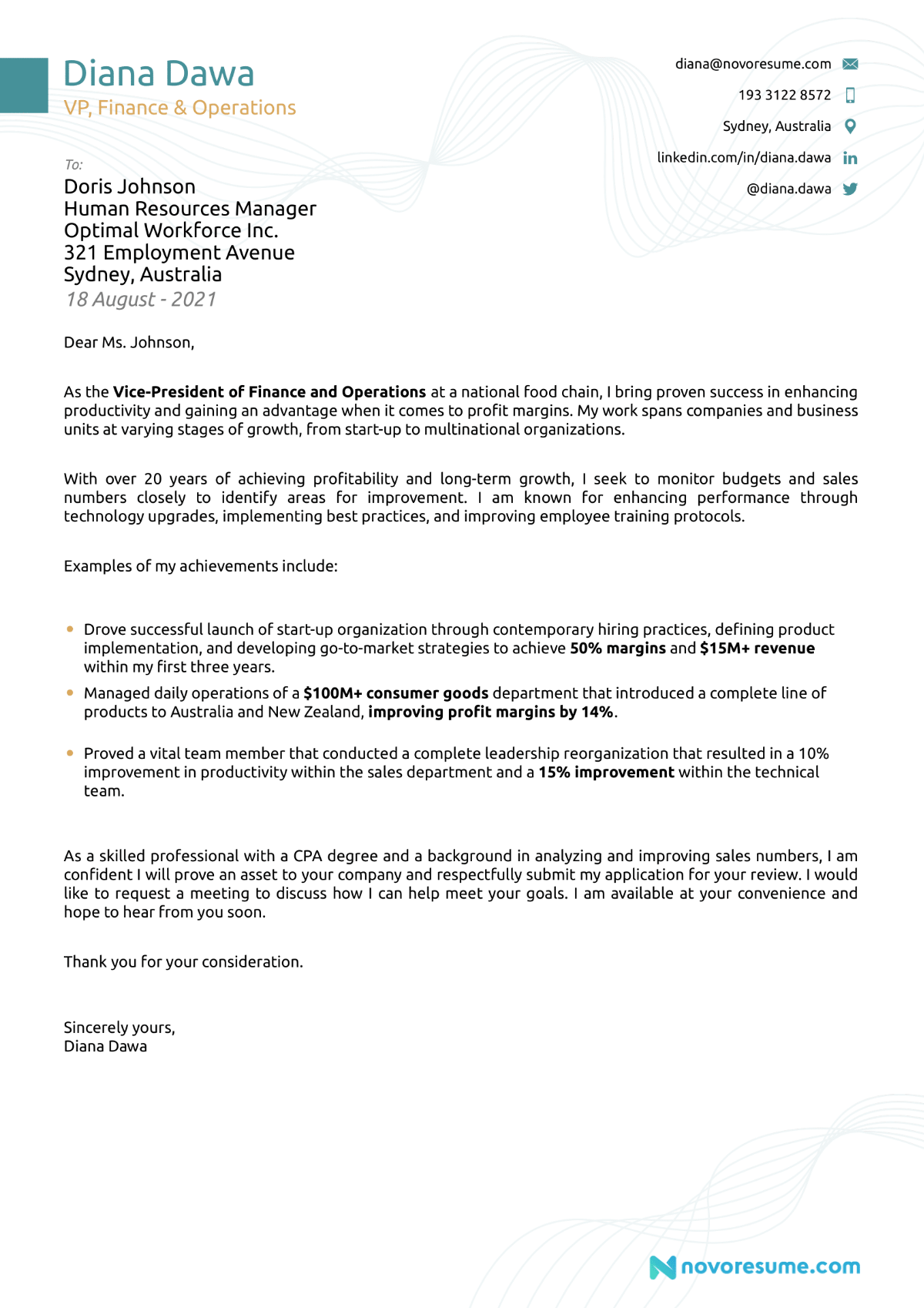
Tip #5: Formatting
The format is just as important as the length of your cover letter. Pay attention to the amount of white space on the page. More white space keeps the content easier to read for the recruiter or hiring manager.
You want to make sure that you use a font that is legible (as the ones handpicked by our team together with recruiters). Keep standard margins and align your text to the left.
Writing a cover letter can be intimidating. If you remember to keep your writing concise and highlight only your relevant experiences, you will be on your way to snagging an interview in no time.
Suggested Reading:
- How to Write a Cover Letter in 2024
- Resume Formats Guide: How to Pick the Best in 2024
- Cover Letter Examples

To provide a safer experience, the best content and great communication, we use cookies. Learn how we use them for non-authenticated users.
Ideal Cover Letter Length: How Long Should A Cover Letter Be?
In This Guide:
How long should a cover letter be, example of one-page cover letter, how to achieve the ideal cover letter length, how to make the most of your cover letter word length and arrangement.

At last, you found the job of your dreams!
The hours of scrolling through websites before bed has finally paid off.
It’s right there on the screen of your phone, just one cover letter away.
You immediately start thinking about all the things you can list in your letter.
Past job experiences, internships, soft and hard skills…
At one point, you notice the short cover letter has turned into a 3-page novel.
Is it too much?
How long is a cover letter?
And how long is too long when you’re writing about yourself and your achievements?
Can a cover letter be too short, resulting in everyone collectively laughing at your lack of imagination and experience?
Stop. Take a moment to breathe.
If you’re researching how long should a cover letter be, you’re already on the right path.
We will answer all your questions and more so that you can create a memorable cover letter that will impress the recruiters and land you the job of your dreams.
And if you need some inspiration, take a look at some cover letter examples .
Be a first-hand witness to how people just like you have found the balance between length and structure to build a cover letter that becomes the center of attention.
Upload & Check Your Resume
Drop your resume here or choose a file . PDF & DOCX only. Max 2MB file size.
The average length of a cover letter is half a page. The content should contain no more than 4 paragraphs . The first one being an introduction about yourself and how you found the position; the second (or second and third) – more about your experience, why you’re a suitable candidate; and the last one an ending with a summary of the info and a call to action.
Here is an example of a successful one-page cover letter with 4 paragraphs.

Now that you know what your end goal should be regarding the length of your cover letter let’s dive into the logistics of reaching that goal.
This includes the structure, the recommended information that should be in it, and some writing and editing tips.
By the end of this article, you will know how to construct a successful cover letter that will increase your chances of getting to your dream position.
And if you’re still wondering why you need one, check out our article on the purpose of a cover letter in an application.

Focus on your relevant skills and achievements
We know you are probably a very skilled individual with a long list of accomplishments.
However, most companies only care about the ones relevant to the job.
Job recruiters go through so many applications a day that the moment they see pieces of information that are not related to what they are searching for, your resume and cover letter are headed to the bin.
If you’re applying for a chef in a restaurant, there is no need to explain how you won a science fair in high school with a DIY solar system.
Listing unnecessary information shows that you did not care enough to do the proper research about the type of employee this business needs.
Include four or fewer paragraphs in your cover letter body
We already mentioned briefly what those paragraphs should contain, so let’s go a bit more detailed.
Paragraph 1 – Introduction
Undoubtedly the most important part – the one you will use to win the recruiters over and invite them to learn more about you.
Start by introducing yourself and how you found out about the position, followed by what motivated you to apply for it. Use this part to showcase your knowledge about the company.
You know exactly what they are looking for and, big surprise, you’re the one that can give it all. If there are any specific things you really like about this business, now is the time to list them.
Paragraph 2 and 3 – Body
Now, this is your time to truly shine. Use this part to list all your achievements, skills, and qualifications that are directly related to the job position.
Use specific examples. “I have many years of experience working with wild cats.” is good, but it can be even more precise. “I have worked as a wild cats rehabilitator in the Oregon Zoo in Portland for 6 years.”
If you’re applying for an HR specialist, pay special attention to your organizational abilities and soft skills. If it’s a more technical and precise position, give examples.
“By transforming business goals into measurable indicators with conversion rate optimization in mind, I can help clients gather and analyze user interactions in a visually appealing way that they can access anytime, anywhere.“
Show the recruiters everything they will gain by hiring you. Cover letters are usually all about how the business will benefit from you, not the other way around.
In case you don’t have enough experience in the field you’re aiming for, highlight your motivations, extra courses you’ve taken, and how you want to develop in the future.
Paragraph 4 – Ending
And now it’s time for the big finale. Thank the hiring managers for their time and undivided attention, provide them with extra contact information and finish up with a call to action.
Let them know when you’re available for a callback, what is the best way to reach you, and that if they have any further questions, you will be at their disposal every day.
You can include one last sentence about how excited you are applying for this position, without sounding too needy, of course.
Write short and direct sentences
The way you express yourself is important. Prolonged and heavy sentences will put anyone off from what they’re reading.
Of course, that doesn’t mean you should write the whole cover letter in simple sentences, as they can sound quite robotic.
But there needs to be a pleasant flow to your writing. The reader should not struggle with understanding your cover letter.
So here are a few tips that will help you write short, concise sentences that are straight to the point and don’t sound like they’ve been written by a bot.
- No “fluff words” – These include words such as “really”, “actually”, “totally”, etc. The main rule is – If you can remove it and the sentence doesn’t lose its meaning, then remove it.
- Use active voice – The usage of passive voice prolongs the sentence with unnecessary clunky words that bear no meaning.
- Get rid of redundant words – “In order to” can be just “to”, “in close proximity” can be “close”. No need to overcomplicate your sentences just to appear smarter.
Here is an example of transforming a long sentence into a short one.
“I truly believe that all of my skills will be of great use to your company should you decide to hire me.”
“If I am hired, my skills will prove to be useful for your company.“
Leave some information to be revealed later at the interview
Outline the most important info but don’t go into too much detail. You want to intrigue the recruiters enough that they invite you for an interview.
You don’t want to leave the impression that they’ve learned everything about you in the span of two short paragraphs, right?
Use a professional cover letter format
The content of your cover letter is the second thing HR managers will see. The first ones are the layout and design.
Our years of experience have shown that candidates that use a professional format for their cover letters have a better success rate when applying for interviews.
Use a readable and plain font, for example, Times New Roman, Arial, Verdana, or Calibri. The size should be no more than 13 point and no less than 11 point. Make it too small, and it’s illegible, make it too big and it looks like you’re trying to fill up space.
Except for the three paragraphs we already talked about, every cover letter should contain the following elements – a heading, a greeting , and a signature at the end.
Leave space between the paragraphs to make the text easy to read and scan, and align the text to the left.
Make sure it doesn’t look cluttered and messy.
Before you start writing, check if there are any specific requirements posted by the recruiters regarding your cover letter. Some companies will tell you exactly what they want for length and content.
Don’t tell too many stories. Giving examples is great but don’t go overboard.
Can my cover letter be 2 pages?
If you’re wondering about a 2-page resume, ask yourself, why do you need it to be so long? Most of the information should be on your resume, the cover letter is just an add-on.
You’re not telling your life story, you’re simply listing all the relevant experience and skills you have so you can get invited to an interview. You will have more chances to market yourself once you get there.
Unless it’s for a pretty high-end position, such as a heart surgeon, professor ina university, or a science researcher, you should be able to fit everything in half a page.
How many words should a cover letter be?
Since we already established that the average length for a cover letter is two-thirds of a page, maximum, how many words is that?
Well, if you don’t have any specific instructions from the employer, keep it between 250 and 400, ideally 300. If you’re using a 12 point font and you’ve written your 3 paragraphs, that’s the usual word count at the end.
In any case, the average word count should be a guideline, not your main focus.
What about academic cover letter length?
The cover letter for an academic position is one of those rare cases where you can exceed the one-page maximum. In
It usually needs to include all sorts of important information such as teaching, research, departmental service, published papers, relevant accolades, and anything else that might be required for the position.
How long should my intern cover letter be?
A cover letter for an internship should follow the same guidelines as the typical cover letter. Between 200 and 400 words is ideal.
It could be shorter, as well. If you’re applying for an internship, chances are you don’t have a lot of experience resulting in fewer things you can include in your cover letter.
- Focus less on how long does a cover letter need to be and more on what is required from the company you’re applying to;
- Always research for specific instructions from the hiring managers regarding cover letter length and other requirements;
- Unless you’re applying for an academic position or another one that demands a longer letter, don’t go over one page;
- The format of the cover letter should be professional and clean. The goal is to make your text easy to scan and understand. You can use Enhancv’s Content Analyzer to check everything.
- Write simply and use short sentences;
- Tailor your letter to the position you’re applying for. Make it personal and show that you care.
What are your experiences with writing cover letters? Have you ever written a cover letter longer than one page?
Tell us in the comments below and if you found this article useful, make sure to share it with anyone who might need it.

- Cover Letter Guides
How To Ace 'Tell Me About A Time You Failed' Job Interview Question
Choosing a marketing career path, what to include in your cover letter, is it ok to lie on your resume, how to write a good linkedin about section for job seekers, what is an activities resume for college tips and examples.
- Create Resume
- Terms of Service
- Privacy Policy
- Cookie Preferences
- Resume Examples
- Resume Templates
- AI Resume Builder
- Resume Summary Generator
- Resume Formats
- Resume Checker
- Resume Skills
- How to Write a Resume
- Modern Resume Templates
- Simple Resume Templates
- Cover Letter Builder
- Cover Letter Examples
- Cover Letter Templates
- Cover Letter Formats
- How to Write a Cover Letter
- Resume Guides
- Job Interview Guides
- Job Interview Questions
- Career Resources
- Meet our customers
- Career resources
- English (UK)
- French (FR)
- German (DE)
- Spanish (ES)
- Swedish (SE)
© 2024 . All rights reserved.
Made with love by people who care.
Resume Templates
Resume samples
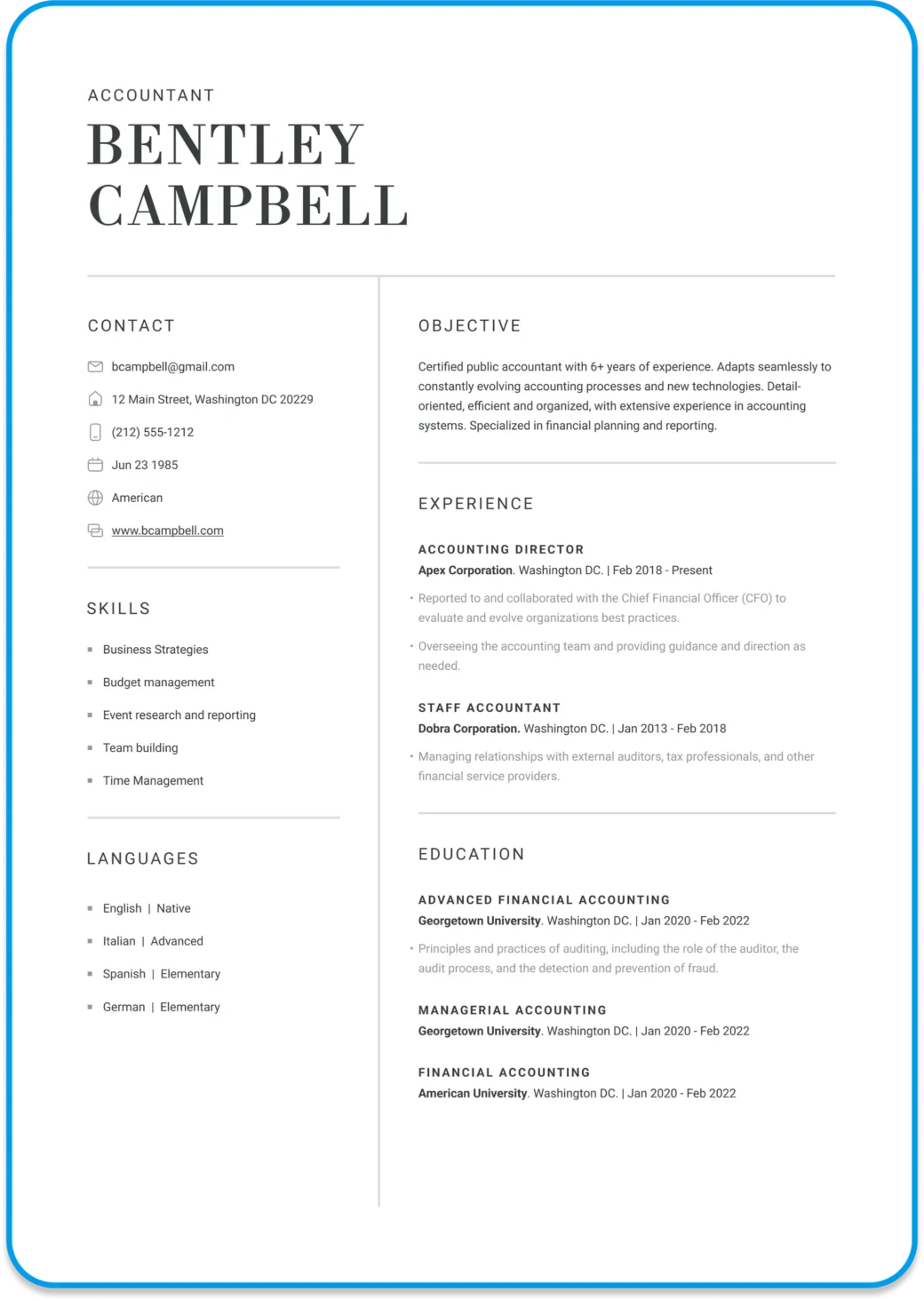
Create and edit your resume online
Generate compelling resumes with our AI resume builder and secure employment quickly.
Write a cover letter

Cover Letter Examples
Cover Letter Samples
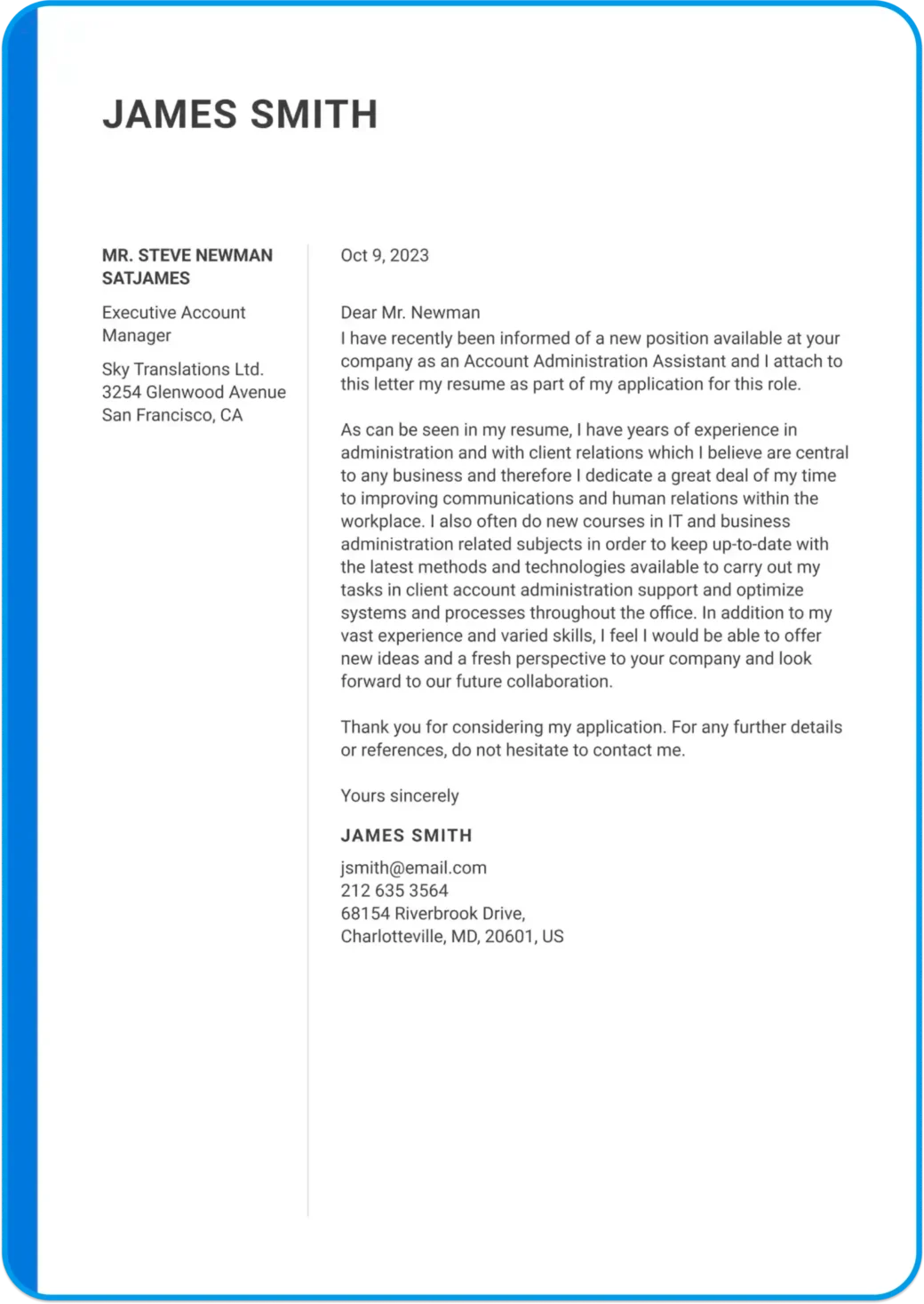
Create and edit your cover letter
Use our user-friendly tool to create the perfect cover letter.
Featured articles
- How to Write a Motivation Letter With Examples
- How to Write a Resume in 2024 That Gets Results
- Teamwork Skills on Your Resume: List and Examples
- What Are the Best Colors for Your Resume?
Latests articles
- Top 5 Tricks to Transform Your LinkedIn Profile With ChatGPT
- Using ChatGPT to Prepare for Interviews: Top Tips and Steps
- How to Create an Effective Cover Letter with ChatGPT
- 10 Jobs in High Demand in 2024: Salaries and Expected Growth

Dive Into Expert Guides to Enhance your Resume
How long should a Cover Letter be?

It happens all the time, you find the perfect job posting online, you fill in all of your info, and all of a sudden you see an option to submit a cover letter .
If it says optional, you may ask yourself, do I even need to submit a cover letter ?
It’s always a good idea to submit a cover letter and ensure it’s well written. One important concept to focus on when writing a cover letter is the length.
So, just how long should a cover letter be?
If a cover letter is too long , will a hiring manager bother to read it? If it is too short, will you come off as lazy or disinterested?
That’s why your cover letter cannot be too wordy or too brief.
Add a good cover letter to a well-made resume, and you have the best combo to strike a chord with any employer.
Using a resume builder to create a professional resume, and following our cover letter advice, will make the task simple.
Keep reading below to understand what the perfect cover letter length is, and ensure your application stands out from the rest.
How many words should a cover letter be?
Before you start writing, you should set a goal for yourself regarding the length of your cover letter. Apart from the number of words, ask yourself:
- How many paragraphs should a cover letter have?
- Can a cover letter be two pages?
Your cover letter shouldn’t be longer than 350-400 words or shorter than around 250 words, according to Indeed.com , and it should be kept to a single page . It should highlight the most relevant skills , experience, or qualifications . It shouldn’t include all your achievements, that’s what your resume is for.
400 words is the maximum limit for the cover letter length , not the recommended limit. Ideally, it should be shorter, providing you can hit the nail on the head.
Cover letter structure
Your cover letter should include the following sections. Make sure the different parts are spaced out attractively. If you’re writing an email it isn’t necessary to include the employer’s contact information or the date.
- Contact information: name, address, city. state, zip code, phone number, email address.
- Employer contact information: name, address, city. state, zip code, phone number, email address.
- Cover letter opening: Dear Mr./Ms. last name,
- First paragraph: Include some information about the position you’re applying for including the job title and how you heard about the position. Briefly say why you are a strong candidate for the position.
- Second paragraph: Expand on why your work experience and qualifications make you the ideal person for the job. Focus on a couple of main points and keep it brief.
- Third paragraph: Thank the employer for considering your application and finish on a positive note. You could say that you’re looking forward to their response.
- Cover letter ending: Your sincerely,
Concise, simple, and readable
Reading your cover letter should be easy. Use short sentences with the occasional longer one for the sake of variety. Avoid over punctuating by using mainly full stops and not too many commas.
Decide the points you want to highlight and them write them in the clearest way possible . You are neither writing an academic essay or a text message to a friend so keep it serious and don’t feel the need to show off your vocabulary. Try to avoid cliches as they lack effect.
Cover letter format
Readability should again be the aim. Make sure there is ample white space and that the text doesn’t look crowded. Leave margins and leave space between paragraphs and the different section of the cover letter format .
Use an easy-to-read font such as Arial in size 11 or 12 as you don’t want the reader to squint. Make sure you left-justify your entire letter.
Check for mistakes
Proofread your cover letter at least twice before you send it. This is one of the best cover letter practices as typos and other silly mistakes give a bad first impression.
You want to show that you’re professional so make sure both your cover letter and your resume are up-to-scratch.
Just like writing a cover letter, understanding how to write a resume will be essential during your job search .
Don’t commit the cardinal sin of handing in a cover letter or resume with grammatical errors or spelling mistakes .
It can be difficult to spot your own mistakes so ask someone else to look at it too if possible.
Read a guide on how to write a resume which maximizes your chance of reaching the interview stage .
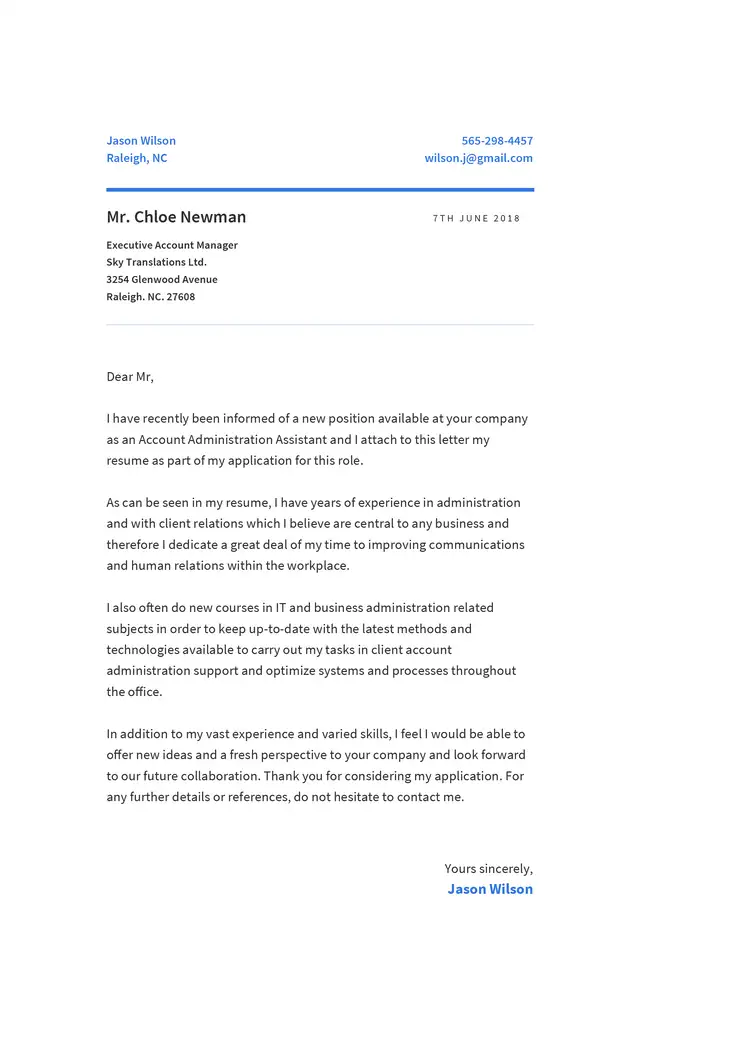
Write your cover letter
Introduce yourself to the recruiters using one of our professional templates.
Related Blog


Media Decision US
The 18 Do’s and Don’ts of Cover Letters Every Job Seeker Should Know
Posted: May 8, 2024 | Last updated: May 8, 2024

Most job seekers don’t spend nearly enough time working on their cover letters, assuming that their resume is enough to get them an interview. But when there is competition, a great cover letter can be the difference between getting an interview and getting passed over.
Your cover letter is your first impression when you’re applying for a new job, and it should be a good one. It’s also an opportunity to show your personality and demonstrate why you’re a perfect fit for the role.
Writing a cover letter can be a daunting task, but you can do a few simple things to make the process easier. Here are some easy do’s and don’ts that can help you write a great cover letter that will impress employers.

Sell Yourself
Like your resume, your cover letter is your chance to brag (professionally) about why they should hire you. Be proud of your skills and accomplishments, and use them to explain why you are the best candidate for the job.
When you sit down to write a cover letter, think about what will grab the hiring manager’s attention and make them want to learn more about you. What can you say about your skills and experience that will set you apart from the other candidates?
If you can, include specific examples of times when you have excelled in a similar role.

Answer the Question: Why Do You Want to Work Here?
You can be more human and personable in your cover letter than in your resume. So be sure to tell the reader why you want the job . This is especially true if you are making a career change or have been out of work for a while.
Briefly explain your situation so that the hiring manager doesn’t have any questions about why you’re applying.
For example, you can say something as simple as: “After ten years of working in office administration, I am interested in finding new challenges in the marketing industry.”

Address How You Meet the Needs of the Organization
There’s a reason most job applications require a resume and a cover letter. A cover letter gives you a chance to communicate with the organization and elaborate on your resume. It’s your opportunity to explain how you meet the organization’s needs and why you should be selected for an interview.
When writing a cover letter, it’s important to focus on how you can help the company reach its goals. You need to do your research to do this.
Find out the company’s goals and plans for achieving them. Then, craft a cover letter that demonstrates how your skills and experience can help the company succeed.
You can also use your cover letter to address some of the other job needs that may be difficult to include on your resume. These are things like having a driver’s license and access to a vehicle or details about your availability, such as when you can start.

Personalize Each Letter
Each employer should receive a personalized cover letter, but don’t worry! You can create one or two cover letter templates and tailor them for each job, just like you should do for your resume.
People still expect your cover letter to follow the formal letter format that includes the date, your name and contact information, and the company’s contact information. Be sure to update each cover letter so that it has the correct details and is addressed to the right person. Addressing your cover letter to the wrong person or sending the wrong letter with your resume probably won’t get a second look.
If you can’t find who to address the letter to, it’s better to use something generic like “hiring manager” or “hiring team” than the wrong name.

Keep it Short
Almost everyone will tell you that your cover letter must be one page. In most cases, this is great advice. Limiting yourself to one page helps you avoid repetition and really focus on what the hiring manager needs to know.
But the truth is, your cover letter should be as long as it needs to be.
I have been successful in submitting a two-page cover letter in the past. In this case, I was applying for a position that was actually two part-time jobs combined into one full-time job. The two roles were related but required different skills, so there was no way to address them all with a single-page cover letter.

Make sure your cover letter is free of spelling and grammatical errors. Use Grammarly (which is free) to catch spelling errors, grammar mistakes, and other language issues that you may overlook. This attention to detail will show the employer that you are taking the time to make sure that your letter is professional and that you are taking the job seriously.
Proofreading your own cover letter (and resume) can be difficult because you have likely read it so many times that you no longer see the mistakes. Having someone else take a look at it with fresh eyes can be helpful. In addition, they may be able to offer suggestions for improvements or point out information that is missing.

Get Their Attention Right Away
Almost every cover letter starts in the same boring way: “I am writing to apply for the [position] job at [company].” This does not tell the employer anything about you or why you are qualified for the job.
Instead, use the first paragraph to grab the employer’s attention and make them want to read more.
You can do a few things to make your first paragraph truly stand out:
- Tell them right away why you are qualified for the position. If you have work experience that matches the required qualifications, mention it first.
- Use strong, active language to engage the employer and show that you are enthusiastic about the position.
- Talk about your transferable skills, such as those you gained from previous jobs, volunteering, leadership roles, or your side hustle. Use specific examples to demonstrate how you have used these skills in the past and how they will help you succeed in the position you are applying for.
Starting your cover letter with a strong hook will immediately set you apart from other candidates and demonstrate your dedication and enthusiasm for the role.

Use Action Words
Use strong action words on your cover letter, such as: created, managed, oversaw, and implemented. These words will demonstrate your ability to take charge and get things done. Hiring managers are looking for candidates who can take the initiative and get the job done, so make sure to highlight your relevant experience and skills by using descriptive words .

Address Employment Gaps or Potential Concerns
Your cover letter is also an opportunity to explain any gaps in your employment history or to address any concerns that the employer might have about your candidacy. For example, if you took a few years off to raise your children, use your cover letter to explain how this has prepared you to return to the workforce and be an even better employee.

If you are out of work, don’t try to hide it. Employers may eventually discover the truth, so it’s better to be honest with them from the start.
Explain your situation briefly and focus on the positive – what you have been doing to stay busy and how you are excited to put your skills to use in a new role. Honesty is always the best policy, and employers will appreciate your transparency.
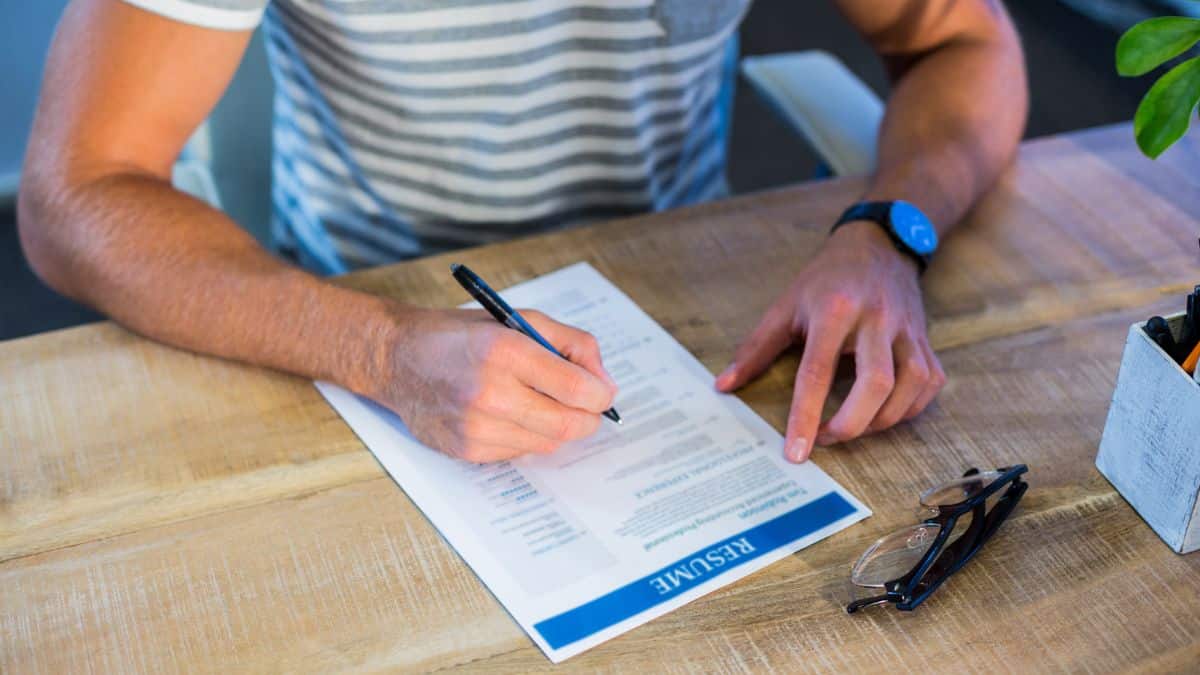
Don’t Repeat Your Resume
Now that you know what you should be doing on your cover letter, let’s talk about some of the things you need to avoid.
Your cover letter is meant to elaborate on your resume, not repeat it. If it doesn’t tell us anything more than your resume already does, why are you even bothering to write one?
Hiring managers don’t want to read the same information twice. They want to see how you can add value to their organization, not just a list of your past accomplishments.
Use your cover letter to talk about your skills and experience in a more natural way. Expand on what you want an employer to know about yourself and your application.

Don’t Be Negative
If you are applying for a new job, you are either unemployed or underemployed, hate your current job , or are worried that you may be about to lose it. None of these situations are fun to be in, but you can’t let that show in your cover letter. You have to keep it positive!
You want to show the employer that you are excited about the opportunity and are confident in your ability to do the job.
If you hate your current job, focus on how you are looking for a new challenge and how you believe this job will be a better fit for you. Or, if you are worried you may lose your job, focus on how you are proactive and are already looking for new opportunities.

Don’t Discuss Why You Need the Job
Everyone knows that you need a job to make money to support yourself and your family. You don’t need to explain this or the details of your specific situation in your cover letter. Mentioning that you are hoping to buy a new house next year doesn’t matter to an employer.
What does matter to an employer is what you can do for them. They want to know how you will:
- make their company more money
- save them money
- make their company more efficient
- help them to avoid potential problems
In your cover letter, focus on what you can do for the employer, not on what they can do for you.

Don’t Make Excuses
Making excuses will only draw more attention to your weaknesses or make you sound like a difficult person to work with.
If you don’t meet 100% of the qualifications they are looking for, that’s okay – just don’t point it out! Let them decide if it’s a deal-breaker or if they are willing to train you in that specific area. They might not even notice!
Avoid making excuses for past job experiences or choices that might negatively reflect on you. If you were fired from a job, for example, simply state that the job wasn’t a good fit and move on. Don’t try to justify your actions or make excuses—this will only make you look bad.

Don’t Lie Or Exaggerate
Many people feel the temptation to lie or exaggerate their skills and experience when applying for a new job. Although lying on your application may seem like a harmless way to make yourself look more qualified, it can lead to serious consequences.
When an employer is interested in hiring you, they will conduct a background check and call your references. If you’re caught lying on your job application, you will likely be immediately disqualified. In some cases, you may even be banned from applying to that company in the future.
Lying on your application can also be a form of fraud, which is a crime in many jurisdictions. Depending on the severity of the lie, you could lose your job, be sued, or even be prosecuted for falsifying documents.
Lying or exaggerating about your experience or education can also lead to problems down the road if you are hired for a position based on false information. For example, if you claim you are proficient at using a specific program that you don’t really know much about, you will struggle in your new role. Not being able to do your job will be stressful and raise questions with your employer. Unless you’re a quick learner, you will probably find yourself job searching again within a few months.
So, the next time you’re tempted to fudge the truth on your application, remember the potential consequences. Be honest on your applications, and you’ll be much better off in the long run.

Don’t Send a Generic Letter
As mentioned, your cover letter should be unique to each employer and job opportunity. Don’t simply copy and paste the same letter for every job application. A few small tweaks are all you need to make your cover letter specific to each job and increase your chances of getting an interview.
If it’s obvious that you’ve created one cover letter and are using it repeatedly to apply to dozens of jobs, it gives the impression that you don’t really care if you get this job or not – you just want any job. And while that may be true, you don’t want to create any apprehension with an employer.

Don’t Use Clichés or Slang Terms
Avoid using clichés, slang, and overly casual language when writing a cover letter. Such language can come across as unprofessional and may not convey the message you are trying to get across in the best way possible.
Clichés include phrases like “I’m a people person” or “I’m a go-getter.” These phrases are overused and do not add anything unique to your letter.
Using slang can give the impression that you are not taking the process seriously. It can also make it difficult for the reader to understand what you are trying to say. Instead, focus on using clear and concise language, which will get your point across in a way that is both professional and respectful.
While it is important to be friendly and personable in your letter, being too casual can make you seem unprofessional and could hurt your chances of getting the job.

Don’t Include Unnecessary Personal Information
There are a few reasons why you should not include personal information in your cover letter. First, it is not necessary. The employer is only interested in your qualifications and not your personal life.
Second, while it may seem like a good idea to make yourself seem more relatable, including personal information can actually have the opposite effect. It can make you appear unprofessional.
Third, including personal information on your cover letter can be a privacy concern. If an employer knows too much about your personal life, they could potentially use this information against you. For example, if you mention that you have young children, the employer may assume that you will need to take time off for childcare. As a result, you may be passed over in favor of a candidate without the same responsibilities.
Lastly, sharing personal information in your cover letter could also lead to identity theft. If you include your home address or phone number, a savvy thief could use this information to steal your identity. By including personal information in your cover letter, you could be putting yourself at risk.
Overall, you should always err on the side of caution to protect your privacy. Stick to the facts and let your qualifications speak for themselves.

Cover Letters Are Tricky But Beneficial
It can be difficult to strike the right tone in a cover letter. You want to sound enthusiastic and professional without coming across as desperate or pushy. The goal is to show that you’re a good fit for the company, so focus on that.
If you’re not sure how to get started, plenty of cover letter examples are available online. Just make sure to tailor the letter to the specific company and position you’re applying for, and only include the skills and experience that you actually have.
With these tips, you should have no problem creating a cover letter that will stand out and help you get hired.

Quick Resume Tips
If you want to make a good impression and stand out from the competition, here are 20 resume do’s and don’ts . Following these simple tips, you can be sure that your resume will make a great impression on employers.

Add Your Side Hustle to Your Resume
Job seekers are told they need to stand out if they want to get hired. But how? One of the easiest ways is to include their side hustle on their resumes . Your side hustle is teaching valuable job skills that can make you a stronger candidate. Not mentioning this on your resume or cover letter is a mistake!
More for You
Caitlin Clark receives harsh warning from Brittney Griner
Video Shows Massive Tornado Roaring Through Tennessee: 'Extremely Violent'
46% of divorced couples say this was the No. 1 conflict in their relationship—and it isn't money
7 CDs You Probably Owned, Threw Out and Now Are Worth Bank
Parents hope story of daughter’s death after consuming beverage will help others
5 Of Hollywood's Most Unrealistic Depictions Of Tanks
3 pieces of information you should never share in a job interview and what to say instead, from a recruiting manager
The 5 most common deathbed regrets, according to a palliative care nurse
Trump’s defense secretary called him ‘a madman in a circular room screaming’, new book reveals
Popular retail chain skips bankruptcy, moves right to liquidation
The Best Robert Duvall Movies
What Is the Anduril Roadrunner? America's Latest Game-Changing Weapon
5 Hot Wheels Cars Worth Way More Than You Can Imagine
5 mistakes everyone makes on the rowing machine
Fmr. Trump comms. director weighs in on tearful testimony
‘I received accolades’: I reported a toxic coworker who threatened me — and I was terminated after 7 years of stellar employment. What can I do?
Chick-fil-A's founding family is worth more than $33 billion. Here's how the Cathys created the fast food chain and how they run it today
The 50 Greatest Creature Feature Movies of All Time
Bugatti's W-16 Engine: The Story Behind Its Unusual Design
Report: Patrick Beverley Suspended by NBA
Purdue Online Writing Lab Purdue OWL® College of Liberal Arts
Welcome to the Purdue Online Writing Lab

Welcome to the Purdue OWL
This page is brought to you by the OWL at Purdue University. When printing this page, you must include the entire legal notice.
Copyright ©1995-2018 by The Writing Lab & The OWL at Purdue and Purdue University. All rights reserved. This material may not be published, reproduced, broadcast, rewritten, or redistributed without permission. Use of this site constitutes acceptance of our terms and conditions of fair use.
The Online Writing Lab at Purdue University houses writing resources and instructional material, and we provide these as a free service of the Writing Lab at Purdue. Students, members of the community, and users worldwide will find information to assist with many writing projects. Teachers and trainers may use this material for in-class and out-of-class instruction.
The Purdue On-Campus Writing Lab and Purdue Online Writing Lab assist clients in their development as writers—no matter what their skill level—with on-campus consultations, online participation, and community engagement. The Purdue Writing Lab serves the Purdue, West Lafayette, campus and coordinates with local literacy initiatives. The Purdue OWL offers global support through online reference materials and services.
A Message From the Assistant Director of Content Development
The Purdue OWL® is committed to supporting students, instructors, and writers by offering a wide range of resources that are developed and revised with them in mind. To do this, the OWL team is always exploring possibilties for a better design, allowing accessibility and user experience to guide our process. As the OWL undergoes some changes, we welcome your feedback and suggestions by email at any time.
Please don't hesitate to contact us via our contact page if you have any questions or comments.
All the best,
Social Media
Facebook twitter.

IMAGES
VIDEO
COMMENTS
Break up your text by adding a blank line between paragraphs, setting 1-inch margins on each side. With lots of white space, your cover letter will look like an enjoyable read rather than a wall of text. 4. Limit your cover letter to four paragraphs. Generally, your cover letter should be between half a page and one full page in length.
November 29, 2023. As featured in *. Typically, a cover letter should be 250-400 words or three to four concise paragraphs. The ideal cover letter length is a half-page to one page long. This cover letter length gives you enough space to communicate your experience and convey your interest in applying while also respecting the hiring manager ...
A cover letter can be anything between half a page and a full-page long. Generally, you should aim for a cover letter word count of 250 to 400 words and about three to six paragraphs. A short, concise cover letter serves as a written introduction to a prospective employer and outlines why you're the best fit for the job.
How Many Paragraphs Should a Cover Letter Include? The typical cover letter should contain three to six paragraphs. Each paragraph should be relatively short, containing two to four sentences. This is especially important in the first paragraph of your cover letter, where you want to entice the reader and encourage them to keep reading by ...
Here are a few tips that'll get your cover letter to the ideal length: 1. Pay attention to your structure. You may remember the five-paragraph essay from school: introduction paragraph, body paragraphs, and conclusion paragraph. Cover letters are structured similarly. Basically, you should lay out your cover letter like this:
The ideal cover letter should typically be between 250 and 400 words. This way, you can keep the letter brief and informative at the same time. However, employers have different requirements, so it's difficult to recommend a standard word count for cover letters. Before you write your cover letter, check to see if the company in question ...
Find the right balance. When it comes to the number of words, never exceed 400 words. 250-300 words are the ideal length of an average cover letter. The perfect number of paragraphs in a cover letter ranges from three to four. The maximum number of paragraphs that are acceptable is six.
Middle paragraph (s) Closing paragraph. Letter ending and signature. Your cover letter should be one page long and use a simple, professional font, such as Arial or Helvetica, 10 to 12 points in size. Your letter should be left-aligned with single spacing and one-inch margins. Show Transcript.
An electronic cover letter should be the length of cover letters on paper. Namely, three paragraphs, 250-300 words, and less than a full page. The difference is, write a great subject line and leave the address section off the top. Should a cover letter be double spaced? A cover letter should not be double spaced. Always single space a cover ...
Ideal Structure and Length. An effective cover letter should have 3 to 6 paragraphs, including an introduction, relevant experience, company details or more qualifications, and a closing. The ideal length for a cover letter is 250-400 words, with concise, focused writing being key to making a strong impression.
Stick to 250-400 words and 3-4 paragraphs. The only difference is that a cover letter email doesn't have a full-blown cover letter header with contact info and starts directly with "Dear Ms. Smith". How Long Should an Entry-Level Cover Letter Be? The general rule of thumb for cover letter length is 250-400 words.
Cover letters should range from a half-page to one full page. Your cover letter should never exceed one page in length. Perfect Cover Letter Length Characteristics. Page Count: 0.5 to 1. Word count: 250 to 400. Paragraph count: 3 to 6.
Cover letters should be one page, consisting of 3-5 paragraphs, and approximately 400 words, maximum. They're written in business letter format with a header, greeting, body paragraphs, closing, and signature. ... This section of your cover letter should be one to two paragraphs. Closing paragraph. In your last paragraph, mention any relevant ...
How long should a cover letter be? In this guide, we explore the right cover letter length, what to include, and some examples to get you started. Jobs. Courses. Businesses for sale. ... Your cover letter should be around three to six paragraphs, or around 250 to 400 words. However, the length of your cover letter may vary depending on the job ...
Well, if you don't have any specific instructions from the employer, keep it between 250 and 400, ideally 300. If you're using a 12 point font and you've written your 3 paragraphs, that's the usual word count at the end. In any case, the average word count should be a guideline, not your main focus.
Do Be Concise: Cover letters should be one page long and divided into three to four paragraphs. The first paragraph should indicate the reason you are writing and how you heard about the position. Include attention grabbing, yet professional, information. For example, "I am an experienced faculty member and industry expert with over 10 years of ...
A cover letter should be between half a page and one page long. Divide the page into 3-4 short paragraphs. So the cover letter word count is 250-400 words, depending on your experience. Consider that recruiters get 75 applications for every vacancy. They just don't have the time to read more.
Your cover letter can be the body of the email with your resume as an attachment. If you are using your cover letter in the body of an email you do not need to do the standard business letter format you will see on the samples with physical addresses. A cover letter should be 3 paragraphs - Introduction, Sales Pitch and Conclusion.
How many paragraphs should a cover letter have? Can a cover letter be two pages? Your cover letter shouldn't be longer than 350-400 words or shorter than around 250 words, according to Indeed.com, and it should be kept to a single page. It should highlight the most relevant skills, experience, or qualifications. It shouldn't include all ...
1. The Ideal Cover Letter Length. Cut to the chase—. Your cover letter should be between half a page and one page long, consist of four paragraphs, and shouldn't exceed 200-350 words. Be concise and at the same time grab attention. If you make your cover letter too long, the recruiter won't read it.
Like your resume, your cover letter is your chance to brag (professionally) about why they should hire you. Be proud of your skills and accomplishments, and use them to explain why you are the ...
Aim for between 250 and 300 words for your cover letter, split into three or four paragraphs and typed in a standard 10 to 12 point typeface. Any longer and you will be in danger of losing the reader's attention. Remember, it's an introduction, not the whole story (that's your CV).
The Online Writing Lab at Purdue University houses writing resources and instructional material, and we provide these as a free service of the Writing Lab at Purdue. Students, members of the community, and users worldwide will find information to assist with many writing projects.
[Verse 1] Dear Adonis I'm sorry that that man is your father, let me be honest It takes a man to be a man, your dad is not responsive I look at him and wish your grandpa woulda wore a condom I'm ...